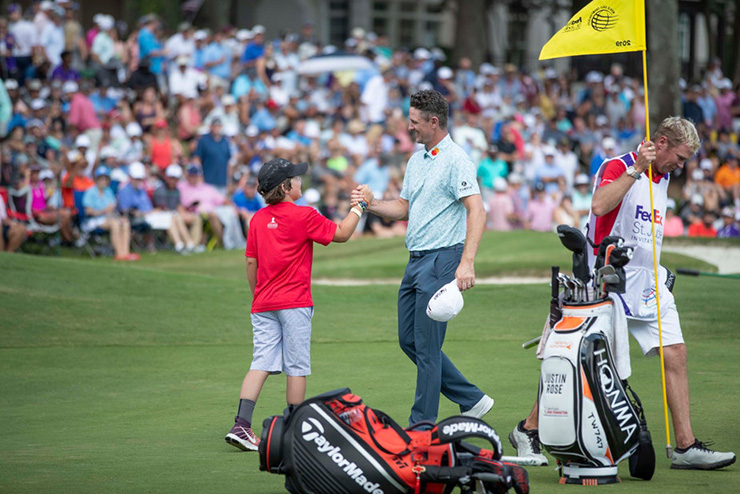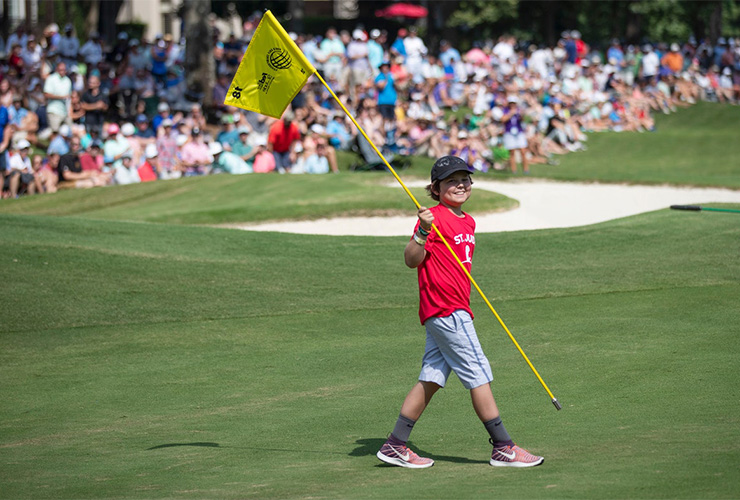By John Strege
Searching, in these dark days, for a beacon, and maybe a dose of perspective, and it is found in a single swing of a 7-iron and a hole with a big heart. Golf is not usually so accommodating, but this time it delivered a heartwarming capstone to a heart-wrenching story.
The hole-in-one, in fact, was a shot heard ‘round the ward, the renowned St. Jude Children’s Research Hospital in Memphis celebrating it with a blog post headlined: “For St. Jude Patient Dakota, Life is Coming Up Aces.”
St. Jude Patient, as identifiers go, is as ominous as it sounds, and Dakota Cunningham, 14, endured it for the better part of three years while gamely withstanding the onslaught of acute lymphoblastic leukemia.
But first the ace. It came on April 2, on the par-3 16th hole at Cherokee Valley Golf Club adjacent to their home in Olive Branch, Miss. “It was about 135 yards, with a bunker on the left and a bunker on the right,” Dakota, 14, said in the cadence of a tour professional describing a shot. “Pin tucked behind the right bunker. A 7-iron. It was tracking all the way.”
It was a shot of which St. Jude’s founder and avid golfer, the late entertainer Danny Thomas, would have been proud. The hospital was born from Thomas’ vow that should he achieve success he would honour St. Jude Thaddeus, the patron saint of hopeless causes, by building a shrine.
Thomas delivered on his vow and helped fund the hospital by hosting the Danny Thomas Memphis Classic from 1970 through 1984. It later became the FedEx St. Jude Classic and has been upgraded to the WGC-FedEx St. Jude Invitational.
‘He’s a miracle, no ifs, ands or buts about it. He is here for a reason.’ —Stephen Cunningham, Dakota’s father
The hospital is there to counter what otherwise might be hopeless causes, as it did with Dakota, though at the outset of his ordeal the signs weren’t promising. One moment, Dakota was a typical 11-year-old with energy to burn, and the next moment, his life upended.
“He had just made the soccer team,” said Stephen Cunningham, Dakota’s father. “We were having a picnic that weekend. It was on a Sunday. It was hot. He was playing with some friends and he came running off the field and his neck was so swollen. He had no neck. You look at it as a parent and think, ‘Oh, my God.’”
Stephen phoned Dakota’s doctor, a family friend. “We’re bringing Dakota over,” he said. “I want you to look at him.” When the doctor examined him, he said Dakota’s lymph nodes were “some of the biggest I’ve ever seen.” He also noted an infection in the back of his throat and took him to his office and administered an injection.
“The lymph nodes started to go down a little bit,” Stephen said. But two days later they began to return, and Dakota was taken back to see the doctor, who scheduled him for an emergency scan at Le Bonheur Children’s Hospital in Memphis.
Stephen was en route home from work that day when his phone rang. It was the doctor. “Why are you calling me?” Stephen asked.
“How long before you get home?” the doctor replied. “Steve, you need to get home quick. Dakota has masses all over him. He has a mass on his throat that we’re very concerned about.”
He was told it was the size of a fist, that it was pressing against Dakota’s trachea and “was all tangled up in his chest cavity,” Stephen said. At midnight, a decision was made to transfer him to St. Jude.
A doctor informed Stephen that Dakota had cancer. How sure are you, Stephen asked? “We’re 98 per cent sure,” he was told. By the morning, they were 100 per cent certain. Leukemia, and possibly lymphoma.
“Basically I had to go in and tell him,” Stephen said. “I told him we’ve been dealt the cancer card, that we’re going to beat it. I said, ‘I’ll always be honest with you through the whole process,’ and that he was going to experience ‘a lot of pain.’”
Dakota had two questions. Would he lose his hair? “Son, your hair is gone,” he replied. What about soccer? “Son, soccer is over for two years.”
“Let’s go,” Dakota said.
Then the nightmare began. “The first week in the hospital was like a whirlwind,” Stephen said. “You have nurses and doctors tell you that your life is about to change. There are certain things you can’t have. You can’t have black pepper. You can’t have tea. You can’t go into the ocean because the ocean has bacteria in it. The common cold, you’re on panic.”
There was pancreatitis, mucositis, foot drop and side effects from chemotherapy. A black belt in taekwondo and a fearless snowboarder, Dakota at times was too weak to walk. “To see him go from that child, to laying on the couch, not able to move for six or eight weeks, to lose muscle where you had to carry your son to the bathroom, is the most devastating thing.”
Soccer no longer was an option, so Dakota embraced golf, a sport he had been around peripherally for most of his life (Stephen once played mini-tours). He began playing in the PGA Jr. League, which provided him an exemption to use a golf cart. He would go for his treatments, then head to the golf course to play matches. Last summer, his team won its state championship.
Dakota also began playing for his middle school team. In October 2019, two days before the school’s final tournament of the season, he went in for his chemotherapy treatment. On the morning of the tournament, Dakota “was on his hands and knees puking,” Stephen said. “He gets up to shower and pukes again in the shower.”
Then he went out and shot a 69 to win by nine. He needed only a par at 18 to break 70 for the first time, then ran his 25-foot birdie putt six feet past the hole. He calmly holed the six-footer.
“Buddy, that’s unbelievable,” his dad said to him, “but why’d you run that first putt past the hole?”
“I wanted to shoot 68,” Dakota said.

Dakota Cunningham gets a high-five from Justin Rose at the 2019 WGC-FedEx St. Jude Invitational. (Photo courtesy of ALSAC/St. Jude Children’s Research Hospital)
Dakota’s growing highlight reel also includes a clutch putt he holed in a charity event at the WGC-FedEx St. Jude Invitational a few months earlier. When Justin Rose left a 50-foot putt five feet short, it was up to Dakota to make the putt to secure a $50,000 donation from FedEx to St. Jude. Rose stepped in to help him read it.
“Dakota turned around,” his mother Tricia said, “and said, ‘I’ve got it.’”
“I was a little bit nervous,” Dakota said. “But I got into my routine, and it was a little right-to-left breaker and I made it.”
The tour pros routinely interact with St. Jude patients and often venture over to the hospital to do so. Dakota met Justin Thomas, and Stephen explained his son’s story to him. Stephen also took his phone out and showed Thomas a video of Dakota’s swing. Thomas began going through it frame by frame, finally stopping it when Dakota was at the top of his swing.
“That’s good,” Thomas said. He similarly was impressed at Dakota’s impact position and even summoned Jordan Spieth over to have a look. Spieth concurred, which was welcome encouragement for a remarkable young man now determined to play NCAA Division I golf, followed by a professional career.
On Monday, the PGA Tour posted on Twitter video of Rose congratulating Dakota on his ace.
One golf buddy to another, @PGATOUR star @JustinRose99 congratulates @StJude patient Dakota on his hole-in-one! pic.twitter.com/LHtyWp3uva
— FedEx St. Jude Championship (@FedExChamp) April 13, 2020
“It’s these little things that get you through it,” Stephen said. “The putt that he made with Justin Rose, little things like that make a difference in these kids lives. I talked to a number of pros and they all say, ‘I’m getting so much out of this.’ Well, they don’t understand how much we’re getting out of it out.”
On Jan. 9, incidentally, Dakota Cunningham concluded his treatments and left St. Jude with a clean bill of health. A beacon in these dark days, indeed.
“He’s a miracle, no ifs, ands or buts about it,” Stephen said. “He is here for a reason.”









